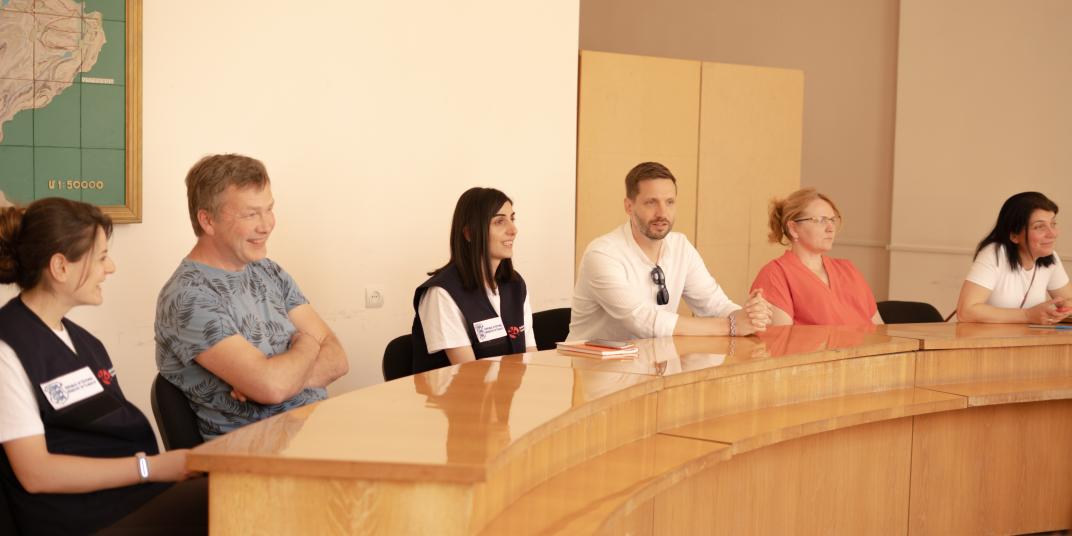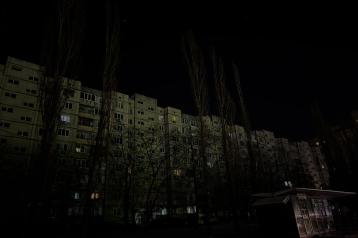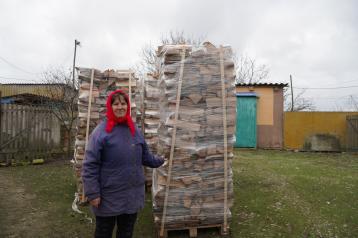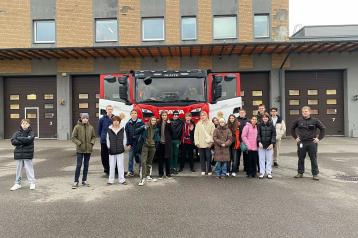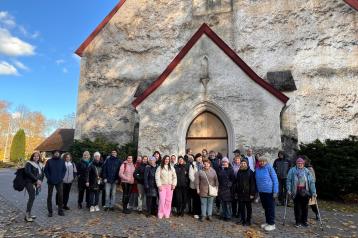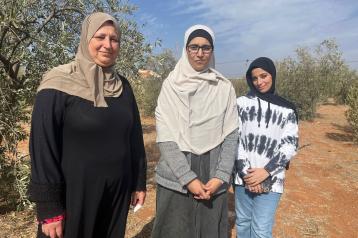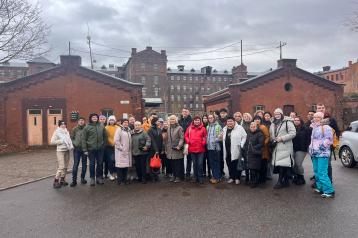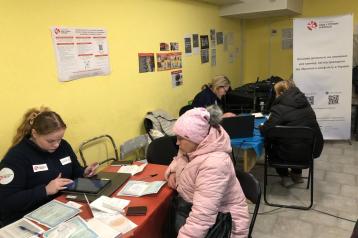Countries
- This year at the Arvamusfestival (Opinion Festival), in cooperation with the Office of the Gender Equality and Equal Treatment Commissioner and the Estonian Human Rights Centre, we are organising a discussion on racism titled I’m not a racist, but…, which will focus on real-life stories from Estonia. Come listen and reflect with us on August 8 from 16:00–17:30 at the Security Area on Paide Vallimägi. In addition, the director of the Estonian Refugee Council, Eero Janson, will take part in a foreign policy discussion titled More Crises, Less Money on August 9.
- A new programme has been launched in Estonia to support Ukrainian refugee youth in language learning and integration. Read more on Estonian Refugee Council’s website.
- In Ukraine, we have started a new entrepreneurship programme in the Poltava, Kirovohrad, Cherkasy, Dnipro, and Kharkiv regions to help local people rebuild their lives and become more self-reliant.
- In June, we visited the Tavush region in Armenia with experts from the Estonian University of Life Sciences to help local schools adopt environmentally friendly agricultural practices such as hydroponics and composting.
- In Jordan, ten women completed a training course in June aimed at spreading knowledge of water-efficient farming methods throughout the region.
- We published our 2024 annual report in June. Last year, our support reached more than 69,000 people. Read more in the Estonian Refugee Council’s annual report.
Ukraine
We provide cash-based assistance, which allows people affected by the war to purchase food, medicines, hygiene products, and other essentials. As of now, we have provided cash-based assistance to more than 300,000 conflict-affected people, worth more than 56 million euros. Cash assistance is provided for three months, with the support of 3600 Ukrainian hryvnias per household member per month, equivalent to about 80 euros. Registration for assistance is carried out through Estonian Refugee Council's local registration points or via the online application platform. Currently, our focus is on assisting those in need in frontline areas in Zaporizhzhia, Donetsk, Luhansk, Kharkiv, and Kherson oblasts. The programme is funded by the European Union, the USAID's Bureau for Humanitarian Assistance (BHA), and the Estonian Ministry of Foreign Affairs. Acted is the lead partner for EU and BHA projects.
In June, we started supporting both new and existing businesses in five regions: Poltava, Kirovohrad, Cherkasy, Dnipro, and Kharkiv. The entrepreneurship programme is designed to equip more than 570 participants with the skills needed to develop and sustain income-generating activities. Participants will gain practical skills in: developing realistic business work plans, creating video pitches to present their business ideas, and preparing to apply for grant opportunities. The programme is implemented in cooperation with WEBPROMO and funded by the BHA.
We support livelihoods related to agriculture, livestock, food production, and various services through emergency assistance, with the aim of strengthening people’s self-reliance. The amount of support is around 700 euros. The programme is funded by the European Union, BHA, and the Ministry of Foreign Affairs of Estonia.
We provide psychosocial support via a mental health hotline for Ukrainians living both in Ukraine and abroad to support the people affected by the war. The work of the NPA Psychological Hotline is implemented in partnership with the National Psychological Association of Ukraine and made possible thanks to funding from ESTDEV – Estonian Centre for International Development.
Estonia
At this year’s Arvamusfestival (Opinion Festival), we are organising a discussion on racism titled I’m not a racist, but… – real stories from Estonia, in cooperation with the Office of the Gender Equality and Equal Treatment Commissioner and the Estonian Human Rights Centre. The few studies conducted on this topic show that racist attitudes are widespread among the Estonian population and are often expressed quite openly. The aim of the discussion is to bring this underrepresented topic into the public spotlight, build a shared understanding of the problem, and encourage people to look for solutions so that people with different skin colors feel welcome in Estonia. The discussion will take place on August 8 from 16:00–17:30 in the Security Area on Paide Vallimägi. In addition, the director of the Estonian Refugee Council, Eero Janson, will take part in a foreign policy discussion titled More Crises, Less Money on August 9. The discussion will explore how the growing gap between intensifying global crises and declining funding affects both target countries and Europe – who can step in to fill the emerging funding gap in the fields of humanitarian aid and development cooperation, and what are the broader implications of this imbalance?
With the support of the European Social Fund+ social innovation initiative, we are implementing the project Language Ladder to support Ukrainian refugee youth in language learning and social integration. Read more on the website of the Estonian Refugee Council. The project is being implemented in collaboration with Tallinn University and the Polish organisation Dobra Fabryka. Funded by the European Union. Views and opinions expressed are however those of the author(s) only and do not necessarily reflect those of the European Union or European Social Fund Agency. Neither the European Union nor the Granting Authority can be held responsible for them.
We conduct monthly adaptation support training sessions on various subjects, including use of e-services, parenting, education system, adaptation of pensioners, legal matters, entrepreneurship, medical and social system, labour market, as well as legal foundations and residence permits. The training sessions take place across Estonia, both in face-to-face and online formats. In June, 188 people participated in the training sessions. Since 2022, a total of over 11,400 people have taken part in these trainings. In addition to the popular rights-related trainings, we also conducted two digital skills trainings in Rakvere and one in Kuressaare in June.
We provide counselling by appointment at the Estonian Refugee Council office (Vambola 6, Tallinn) every day from 10 am to 5 pm. Our information hotline is open to all refugees, as well as institutions and individuals assisting them, at +372 5881 1311 (Monday to Friday from 10 am to 5 pm), and via email at counselling@pagulasabi.ee. Additionally, counselling services are available on Viber, WhatsApp, and Telegram at +372 5464 0007.
We organise regular group activities and community events across Estonia. In June, more than 300 people took part in community activities across Estonia. Several community events were held to support language learning, youth engagement, and community integration. For example, we held an art workshop for young people in Kohtla-Järve, and visited the Parliament (Riigikogu). Community activities are supported by UNHCR, the UN Refugee Agency.
We are running the MindSpring group based programme for people with refugee backgrounds to help them adjust to life in a new country. In June, a group in Tallinn successfully completed the programme, and we will launch several new groups in the autumn season. The programme is being implemented with the support of the Estonian Ecumenical Relief Organization (EERO Canada), funded by donations collected in Canada and the United States.
In cooperation with the Integration Foundation, we are launching training activities to strengthen the capacity of local governments in the fields of migration and integration. The project is co-financed by the Asylum, Migration and Integration Fund (AMIF).
In June, we organised two camp sessions for a total of 40 young people, with the aim of supporting, among other things, practical language learning. The camps were supported by the European Union (through the ESF+ social innovation initiative).
On 20 June, we organised a youth event in Tondiraba Park to mark World Refugee Day. Throughout the day, visitors could take part in a range of exciting activities, including an orienteering game, language learning sessions, and a migration-themed quiz. Everyone was welcome to share their thoughts on the Wall of Solidarity and observe the creation of street art by local artists. Read more on the Estonian Refugee Council’s website. The event was supported by the City of Tallinn and carried out in cooperation with Tallinn Youth Centres, UNHCR, the UN Refugee Agency, IZUM Youth Club, and the Integration Foundation.
Armenia
In Armenia, we are establishing hydroponic greenhouses at three schools in the Tavush region and supporting the adoption of water- and energy-efficient agricultural solutions. We help the schools cope with the impacts of climate change and ensure food security in water-scarce conditions. Programme also supports environmental education for children and increases student engagement with agricultural and environmental topics. Our partner is the Estonian University of Life Sciences to apply Estonia’s expertise in setting up and managing hydroponic greenhouses, composting systems, and energy-efficient agricultural practices. In June, we visited the Tavush region with experts from the Estonian University of Life Sciences to share Estonia’s experience with sustainable solutions and explore possibilities for applying similar practices in Armenia. The programme is financed by the Ministry of Climate from international cooperation funds.
Thanks to funding from the European Union, we are launching four community councils in Armenia to enable people with refugee backgrounds to voice their concerns, advocate for solutions to their problems, and take part in decision-making processes that affect them. Similar community councils have been established in both Estonia and Georgia. In addition, we are running self-help groups that support the mental well-being of people with refugee backgrounds. Two new self-help groups in Hrazdan and Dilijan will begin work this month. The programme is funded by the European Union.
Georgia
We are continuing the implementation of our new programme aimed at strengthening local non-governmental and civil society organisations in Georgia. The programme will enhance organisations’ capacity to navigate regulatory challenges, secure the funding needed for their operations, and strengthen cooperation across different regions. In June, we conducted interviews and selected qualified expert trainers as well as participating organisations.
We support Ukrainian refugees in Georgia through cash-based humanitarian assistance. Each eligible household will receive one-off support of 265 GEL (approximately 93 euros) per person, for up to three family members.
Jordan
In Jordan, we support the self-sufficiency of vulnerable female-headed households through smart and climate-friendly agricultural practices. 12 out of 40 women will receive startup grants in the form of fully constructed hydroponic greenhouses, enabling them to secure food for their families and generate income through produce sales. The project also extends its reach to four female-led community organisations, providing them with hydroponics training to promote water-efficient agricultural methods across the region. The first ten women have now completed the training, gaining the knowledge and skills needed to conduct similar trainings in their communities in the future. The activities of the Estonian Refugee Council in Jordan are supported by ESTDEV – Estonian Centre for International Development.
Syria
The Estonian Refugee Council is opening an office in Syria to support people affected by the civil war and help them rebuild their lives. The Refugee Council has been involved in regional support for Syria since 2018 and has also supported the long-term self-reliance of Syrian refugees in Jordan and Lebanon.
